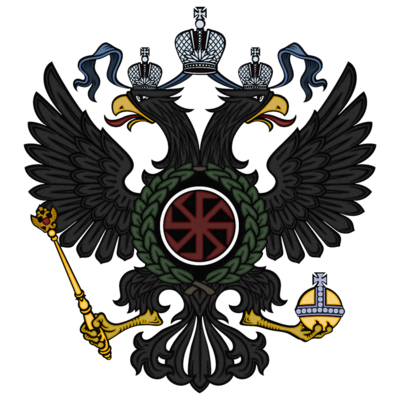Slavic Union Party
Slavic Union Party Партия славянского союза | |
|---|---|
 Slavic Union Party Logo | |
| Abbreviation | PSS |
| Vozhd | Matvei Pavlov |
| Secretary | Anton Petrov |
| Chairman of the Duma | Georgii Federoff |
| Founder | Nikifor Osipov |
| Founded | July 18, 1929; 92 years ago. |
| Headquarters | Osipovgrad |
| Newspaper | United Slav |
| Student wing | Students for National Unity |
| Youth wing | Young Slavs League |
| Women's wing | Women of the Union |
| Paramilitary wings | Shturmovik |
| Ideology | Osipovism, Unitism, Slavic Nationalism, Conservatism, Anti-Communism |
| Political position | Right-Wing |
| Religion | Orthodox Christian |
| National affiliation | National Union |
| Slogan | Union above All! |
The Slavic Union Party (PSS) (Slavic: Партия славянского союза, Partiya slavyanskogo soyuza) was the sole governing party of the Slavic Union from 1940 to 2021. The PSS was founded in July 1929 by Nikifor Osipov, shortly after the end of the Slavic Civil War as a way to help Osipov achieve his political goals. The party grew quickly due to Osipovs immense popularity. The party was abolished in 2021 as a result of the August Revolution (Slavic Union)
In 1940 Osipov established himself as Vohzd, making the PSS the only party legally allowed in the Union.
The PSS is dedicated to pursuing the goals and ideology of Osipovism, based on the writings, policy, and general philosophy of Nikifor Osipov.
History
The party was formed in July 1929 by Slavic general Nikifor Osipov, his right hand man and second in command at the time was Sergei Antonov, a fellow veteran of the Ledyanaya War, Antonov often stayed behind the scenes and was unable to gain the same popularity as Osipov due to various factors, the most prominent of which was his apparent eccentricities.
Electoral Politics
In 1930 the PSS would contest the 1930 Duma Election, where they would win 20.6% of the vote and 93 seats in the Duma. While they only finished 3rd overall they would be crucial, while the Social Democratic Union had finished first they did not control enough of the Duma to form a majority, leading to the formation of the Nationalist Coalition, consisting of the Conservative Party (Slavic Union), the PSS, the Royalist Party, and the Orthodox Party.
This coalition and the SDU's failure to secure a victory would lead to the collapse of it's already shaky alliance with the Liberal Party, this compounded with party infighting effectively crippled the Slavic left for the 30s.
In 1933 Osipov and Antonov would battle for control of the party, Osipov would ultimately retain control, with Antonov and his followers splitting off to form the People's Legion, a more extremist, irredentist party following Antonov's Krovism ideology.
In 1934 the leader of the Conservative Party Yuriy Onipchenko died and his successor Milan Gusev worked with Nikifor Osipov to merge the two parties, this merger for the most part guaranteed PSS control over the right. Later that year the PSS's main opponent, the SDU, broke into two parties. ' In 1935 the PSS would outright win the election, establishing a clear majority and dissolving the Nationalist Coalition.
In 1940 Nikifor Osipov declared himself Vozhd and banned all other political parties from the Slavic Union, including the Legion.
Ideology
See Also: Osipovism Osipovism is the official ideology of the Slavic Union, based on the writings and policies of Vozhd Nikifor Osipov. Slavic nationalism, militarism, pan-Slavicism and authoritarianism are key components of the ideology. Osipov advocated a war based economy focused on constant growth and expansion of the military but today this is a position held only by hardline Osipovists and economic system tends to vary based on the interpretation.
Osipov believed that to keep order in a nation, especially in a nation like the Slavic Union, force and power was a necessary tool, and that the governments only priority was to protect it's people from outside threats and that democratic systems simply got in the way of that priority. Osipov also wrote in his books that the most important thing a citizen could give their nation is complete and total devotion to the state.
Economically Osipov believed the military should be constantly expanding in order to protect the people of the nation, he also advocated for complete self-sufficiency, in both the citizens and the state itself in the form of autarky.
Foreign policy wise Osipov advocated for complete isolation in the form of armed neutrality. Desiring a united Slavic nation but also being very untrusting and suspicious of foreign powers, he also rejected the subjugation of other races as a goal, believing that the only thing that mattered was whether or not one was completely loyal to the state and that racial divisions simply fought against the unity which must be present in the state.
Osipovism is also sometimes referred to as unitism when discussing interpretations to Osipovs and foreign parties with the ideology.